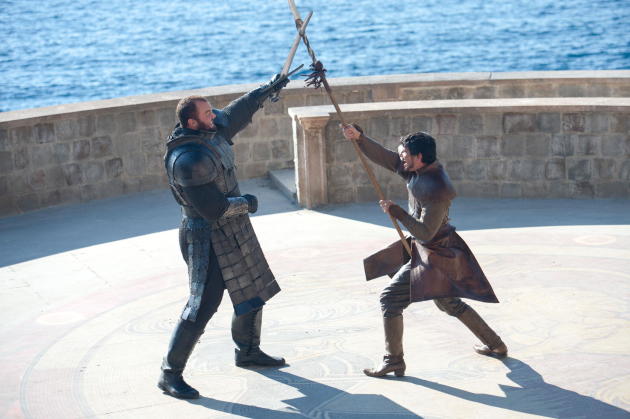The successful reign of Game of Thrones
Featured image source: entertainmentweekly.com
When HBO started Game of Thrones, no one really knew how well the show would do. Here was an adult fantasy show with (initially) very little on the actual fantasy and a penchant to kill off favourite characters. Four seasons later and it is arguably one of the most popular shows around, scooping up critical accolades and awards while simultaneously becoming the most illegally downloaded show ever, a high honour I assure you.
It has successfully courted fans of the books and newcomers to the franchise alike, while managing to orchestrate one of the most ambitious cast and location ensembles in history. But while it is easy to lump Season 4 in with the previous three in order to sing the show’s praises, when considered independently as the 10-episode arc it is, this series reveals its own set of strengths – and a fair few weaknesses too. With locations and characters for Season 5 already being announced, now is as good a time as any to take a look back.
On the positive side, the usual elements are still there. The acting remains as strong as ever, hardly surprising given the fact that the cast has stayed much the same with the exception of three recasts and a few new characters. Said new characters lend further proof to the excellent quality of the casting directors. A lot has been said of Pedro Pascal’s turn as Oberyn Martell of course, and rightfully so, but Indira Varma’s Ellaria Sand has also been a fantastic representation of the character.
It also helps that the younger actors, like Maisie Williams (Arya), Sophie Turner (Sansa) and Isaac Hempstead-Wright (Bran), have more confidence and have improved their acting. Turner’s final scenes were a joy to watch, although that is also down to the fact that her character finally hit her stride, while Williams is now on-par with Peter Dinklage (Tyrion) for show favourite.
The on-screen nature of the adaptation has, of course, allowed for some strong characterisation in the past. Robb Stark, for instance, never had a chapter focused on him but he definitely benefited from not relying on an intermediary narrator in the show. This continued in the fourth season, most notably with the Tyrells, who have become fan favourites and genuine players in the Game. This has also allowed implied elements of the novels, like Loras’s homosexuality, and Oberyn and Ellaria’s bisexuality, to be explored properly.
At the same time, the decision to streamline elements of the book – such as reducing Daenerys’s retinue – has paid off handsomely by keeping the focus on a relatively smaller group of characters than would otherwise have been the case. Interestingly, additions to the book – such as the Missandei-Grey Worm relationship, Bran’s near-encounter with Jon, the Brienne-Hound fight, and Sansa’s transformation, to name a few – have also worked out well, by allowing characters who would otherwise have become one-dimensional to grow.
Which is not to say the show has been perfect. For all it has gotten right, Season 4 still ended up being arguably the weakest overall season to date. While a bigger budget might give it more of a sheen than Season 1, it fell into the same pacing trap, with many episodes never really taking off, barring one scene towards the end. For a new show, that is excusable. For an established one, it is less so, especially given the fact that the action-packed opening and ending episodes could probably have been spread out more evenly to compensate.
For all it has gotten right, Season 4 still ended up being arguably the weakest overall season to date.
More worrying has been the nonchalant crowbarring of violence. Thrones has always been rooted in a sense of gritty reality, where no character is really safe. This is has been in the past quite admirable, because it makes a fantasy world all the more realistic. However, this season amped up the violence – more specifically, the threat of violence – to extremes. I am not talking about scenes like Oberyn’s death; that was lifted from the source and, for all its nauseating gore, it was still a cracking visual, pun unintended.
That being said, the number of times the threat of murder and sexual violence was thrown around was nothing if not callous. Meera and Jojen (at Craster’s), and Gilly (at Mole’s Town) did not have to be threatened so verbally. While I doubt the writers actually consider these fears so casually, a lot of it did feel indifferent. Of course, having an actual rape scene did little to assuage this concern.
I refer of course to the controversial scene between Cersei and Jaime. For the record, the book had a similar scene – albeit with ambiguous consent rather than an outright “no” from the Queen regent – but the timing was different, with Jaime having just arrived in King’s Landing, clearly traumatised from the loss of his hand and his son, as opposed to having spent several weeks in their company. While still not excusable, the television adaptation did strangely fit in with the deviated events from the novel up until this point, and did not regress his arc.
Character development, barring such problematic blips, was still strong but the forced equal screen-time became a little grating. The constant need to check in on characters meant that some stories lost their impact due to interruptions. Paradoxically, it also meant that some characters did not get enough time to shine. Jojen’s death, for example, felt like a ratings stunt, not least because we did not spend enough time with him and Meera in the show to actually connect with them. Having an entire episode set at the Wall, especially following the drag of the middle episodes, did not help matters either.
At the end of the day, Game of Thrones is still one of the best shows out there. Season 4 was weak by its own standards, but it was still a good season. The problem, however, is if subsequent seasons let these weaknesses fester instead of building on the strengths. The strong finish to the season indicates that the show-runners are indeed leaning towards the latter, but only time will tell if that is the case.



Comments